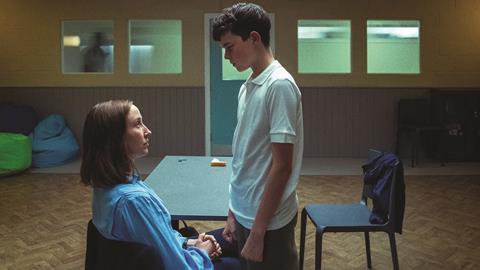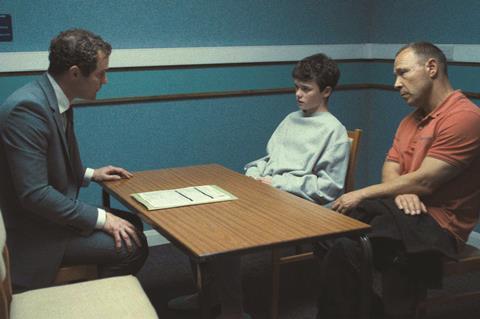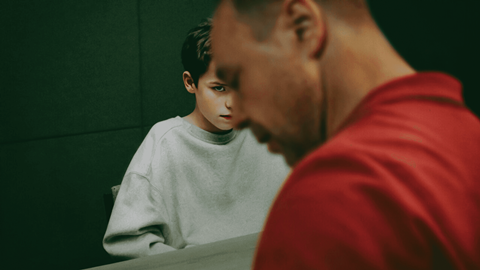As the hit Netflix series Adolescence prompts a national debate about toxic influences on young men, Martin Saunders suggests practical solutions the Church needs to adopt now
Three Gospels record the interaction between Jesus and the rich young man. In each, the Messiah is approached by a man in his 20s or 30s, who Luke describes as a ruler, and who all three credit with great wealth. The story is consistent: the man arrives with a sense that he has everything figured out except for the one thing that money can’t buy: eternal life. Not only is he fabulously rich and successful, but he’s also managed to work out how to play the system, perfectly navigating the letter of the Jewish laws while ignoring the spirit of them. He probably has legions of admirers; men who know of him almost certainly aspire to follow in his footsteps.
Yet in a momentary interaction, Jesus exposes the crack in the foundations of his winning formula. His wealth and success are the very things that are holding him back: he’s built an idol of the self-made man; of the pre-American, American dream. Then, Jesus presents him with a solution to his conundrum, but it comes at some significant personal cost. If he wants eternal life, he doesn’t just need to dismantle his material empire; he needs to give some of the proceeds away, and support others instead of continuing to look only to himself. When he hears this, Luke writes, he becomes “very sad” (Luke 18:23). Incredibly, he walks away.
Men (and plenty of women) have found themselves in the rich young ruler’s position ever since. They have followed a path of accumulation. But no amount of earthly wealth or status is ever enough to satisfy us. Meaning and eternal purpose are always elusive when we only look inward, or build up the self. And it is the realisation of these truths, and the emptiness found in denying them, which leads us to toxic masculinity.

Boys in the spotlight
The creators of hit Netflix show Adolescence knew they had something special on their hands. They just didn’t realise – until the first few days of global ratings were revealed – just how special, or indeed how important. Stephen Graham and Jack Thorne’s four-part psycho-drama, which debuted in March, not only drew tens of millions of viewers and found an audience way beyond these shores, but kickstarted a national discussion about the state of teenage boyhood.
The show’s innovative format – each episode is a single-shot window into a different aspect of a teenage murder case – raises far more questions than it answers. We’re whisked through a dysfunctional school and asked if the British education system is breaking; we get a ring-side seat for a gruelling two-hander between 13-year-old Jamie and his psychologist, and forced to confront the damaging influences being wrought on young people – and particularly boys – by the online world. The question of what makes a good father is introduced but never resolved. It’s no wonder that the series has spawned the kind of singular public conversation rarely seen in an age of such diversified media.
Millions of children have no father figure in their home
Around the same time word-of-mouth marketing was putting Adolescence at the top of every worried parent’s watchlist, former England football manager Gareth Southgate was using a different platform to raise a similar set of concerns. Delivering the BBC’s now-biannual Richard Dimbleby Lecture, Southgate took aim at “the negative impact of social media on young people” and said that because “boys are spending less time at youth centres, sports facilities and community events…they aren’t meeting the traditional role models [he] used to meet such as coaches, youth workers and teachers.” This, he claimed, twinned with the fact that millions of UK children have no father figure at home, means that the “void is filled by a new kind of role model who do not have their best interest at heart”.

The rich young influencer
When Southgate went on to say that “these are callous, manipulative and toxic influencers, whose sole drive is for their own gain”, a single name will have leapt to the forefront of every clued-up listener’s mind. Andrew Tate has become to toxic male influencing what Hoover once was to the vacuum cleaner. The British-born self-styled king of misogyny – only recently released after being detained in Romania on human trafficking charges – has bragged to his legions of fans that he “got away with” breaking a women’s jaw, has been accused of rape by multiple women (which he denies) and is on the record as calling women “intrinsically lazy”. He openly ridicules men who practise any kind of gender equality. It’s not hard to see why his growing position as a role model for young men is a source of such moral panic.
Tate and his lesser-known contemporaries are not just offering twisted relationship advice. They’re pushing a worldview – a replicable design for life and success which they claim has granted them everything they could want. “I have everything every man has ever dreamed of,” claims Tate. “I got a big mansion, I got super cars, I can live anywhere I want, I got unlimited women, I go where I want; I do anything I want all the time.” Without wishing to pour undue scorn on the rule-keeping character from our opening story, the sentiments do sound biblically familiar. Tate and co are the rich young rulers of our era, and as Southgate suggests, they are the only beneficiaries of their broken worldview.
Boys feel disaffected and let down by society
Like the Gospels’ rich young man, their great failure is their lack of care for the wider community. Jesus meets a man who appears indifferent to the people lower down the social pyramid that he sits atop; Tate seems to have little regard for either the boys he is influencing or the women who will certainly be impacted by them. He appears to show no concern that his command to men to show strength, ambition and confidence rather than empathy and vulnerability might cause some to act out in an extreme and dangerous manner.
Yet there is a growing body of evidence that suggests males are listening, and acting dangerously as a result. Tate’s influence is specifically named in the second episode of Adolescence, but it has also made its way into real-life cases that are just as shocking. Kyle Clifford, the former soldier who killed three women, including his former partner, had searched for Tate’s podcast in the days before those attacks. That podcast, and Tate’s various other platforms, are at the forefront of a tidal wave of online content broadly self-characterised as “the manosphere”. This category is increasingly popular in another disturbing, but extremely significant cultural movement…

Incels
The incel (involuntary celibate) subculture is a network of online communities, populated by mainly young men who feel unloved or unwanted by women. Misogyny becomes a form of belonging here, and the idea that life is meaningless without sexual conquest takes hold. Incel chat forums are often filled with anger, blame and even calls for violence against both women and attractive men perceived to have won the genetic lottery. This movement has been name-checked in various international court cases in recent years, including the murder of ten people in Toronto in 2018, a 2020 machete attack in the same city and a series of violent crimes across the United States.
The obvious question, then: why is the incel subculture drawing in so many young men? Influencers such as Tate are the poster-boys and often the gateway, but their appeal only offers part of the answer. Boys also feel disaffected and let down by society. They can feel invisible or rejected, especially as Western cultures look to rightly rebalance historic gender and race biases. They are perhaps naturally drawn to an easier option of blaming the ‘other’ above the hard work of personal growth. And all the while, their brains are being toxified by an unstoppable, secretive force.
Internet pornography, which remains largely unregulated, plays a destructive role in young men’s ability to form and maintain relationships, and to view women appropriately. Terrifyingly ubiquitous both outside the Church and within it (a 2024 Barna study claimed that “just over half of practising Christians report consuming porn with some level of frequency”), adult websites teach young men to view sex as transaction, intimacy as performance and women as objects. So before many boys have ever even enjoyed an innocent crush, they’ve been exposed to a brutal, loveless, self-gratifying vision of male-female interaction. And this isn’t just an issue for boys: the notorious British adult performer Lily Phillips recently claimed in a BBC Newsnight interview that watching porn from the age of eleven (now the average age of first exposure) had given her a form of sex education.
All of this is then supercharged by social media platforms that profit from controversy and outrage. TikTok, YouTube and a host of other platforms and channels feed young users increasingly extreme content based not just on their viewing habits but on their perceived demographic. A boy who goes looking for a fitness video might soon find himself watching misogynistic rants, conspiracy theories or extremist ideologies without ever intending to. A 2022 Observer investigation proved that social media platforms – and specifically TikTok – directly target young boys with manosphere content, by setting up a fake account for an imaginary teenager. Within a week, eight out of the first 20 videos recommended to the ‘boy’ featured Tate.
The picture, then, is depressing. Often lacking fathers or other strong role models, boys are drawn into a web of hyper-sexualised, violent and misogynistic ideas, and they are driven there by unscrupulous digital companies which prize profit well above morality. Once welcomed into this dubious club, they are sold a worldview which also makes financial gain the goal, alongside power – especially over women. Adolescence is a story about how that worldview not only fails to deliver on its promises, but has devastating implications for the rest of society. So the question is: Does the Christian faith have any answers?
The ultimate male role model
There are plenty of figures in both Old and New Testaments who demonstrate positive character traits to which males could aspire. Joseph resists temptation, shows self-control and acts with integrity. Paul mentors and invests in others. Jonathan is a loyal friend. David demonstrates humility and contrition.
The centre of the biblical view of masculinity, however, rests, unsurprisingly, on Jesus. He is strong, but never domineering; courageous, but also humble. He expressed his strength and power not through control, but through sacrifice. He challenged injustice, protected the vulnerable and ultimately laid down his life for others. He is, without doubt, the ultimate role model for young men, older men, and women too. I wrote about this idea extensively in my book for teenage boys, The Man You’re Made to Be (SPCK).
Let’s be realistic, though. The fact that the Bible has a wonderful, countercultural and potentially transformative model of masculinity in Jesus is only helpful if you know him. And to be brutal, the vast majority of men don’t know Jesus, and aren’t listening to us Christians right now. So what do we do?
What churches can do
It will not surprise you that I believe part of the answer lies in a much greater investment in youth work. The Church already has the largest workforce of paid and volunteer youth workers in the country, and these numbers are increasing thanks to recent denomination-wide investment from the Church of England, Elim, Salvation Army and more. While parachurch support is useful, however, the impact is only felt when individual local churches, situated in every community up and down the land, decide to prioritise young people. We have, in our congregations already, a huge network of positive male role models – the kind that Southgate believes young men so badly need. We need to grow their confidence and skills in connecting with and mentoring young people; doing so could yield rapid results.
What young men require from us is connection, nurture and attention
One of the most shocking elements of Adolescence is its depiction of British schools. While I’d argue that the show takes an unfairly dim view of both young people and the teaching profession, there are parts of the country where its vision of an out-of-control high school is not completely wide of the mark. Every church has at least one local secondary school nearby, and it should be a missional priority for every single one, not just for prayer (which is vital) but for practical support too. Schools provide excellent opportunities for churches to collaborate and work together, and in most cases – with budgets and pastoral needs both creaking under pressure – they are crying out for help.
On a national level, churches and Christian organisations have a voice, and must use it to speak out on these multitudinous and complex issues. The prolificacy and normalisation of internet pornography should be calmly and continually challenged. Support for boys, particularly those in danger of being left behind because their communities or demographics are not prioritised, must be advocated for too. The voices of young men must be elevated and taken seriously. Christians, both individually and organisationally, can make an impact on these things, and more.
One boy at a time
If you find yourself talking to a young man, either in a familial context or elsewhere, you don’t need to worry that a monster is lurking inside. Adolescence presents an outlier: the rare person whose latent psychopathy is activated by the incel subculture. Neither does the intervention need to be dramatic; what young men require from us is connection, nurture and attention. Jamie’s haunting question to his psychologist in episode three is perhaps the most affecting moment of the whole drama: “Do you like me?” It’s the deep-down question that every boy asks.
Once that’s resolved, we can begin to address some of the needs that Tate and his fellow influencers are so unsatisfactorily meeting. Questions of meaning and purpose, and ultimately of a good and enduring life. “You still lack one thing” says Jesus. “Sell everything you have and give to the poor, and you will have treasure in heaven. Then come, follow me” (Luke 18:22). Ultimately this is the Christian faith’s antidote to toxic masculinity. To de-centre ourselves, love our communities and follow in the footsteps of the ultimate role model. But we can’t just leap to that answer; we need to roll up our sleeves first, and show boys just how much we care about them.
Martin Saunders’ book The Man You’re Made to Be (SPCK) is available now
Want to raise faith in the next generation? Visit premiernexgen.com for free tips and resources







































2 Readers' comments